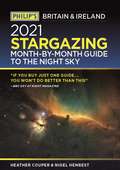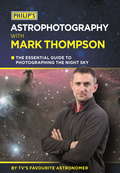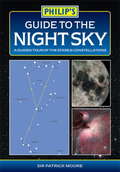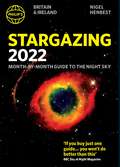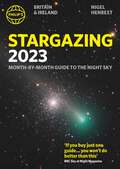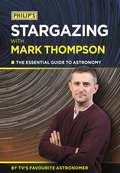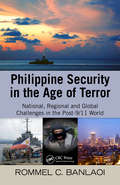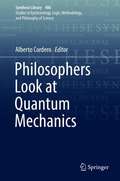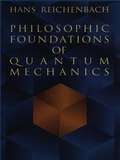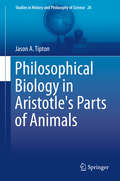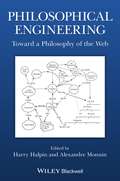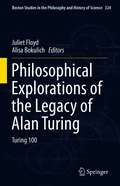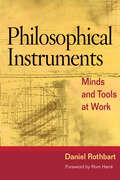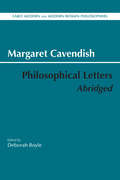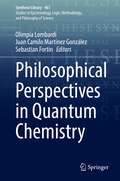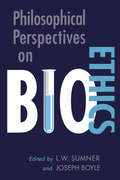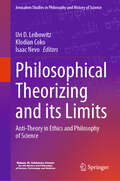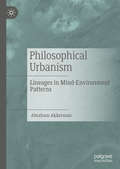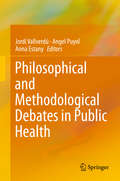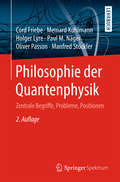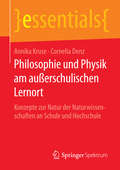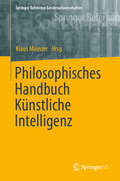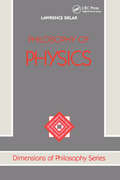- Table View
- List View
Philip's 2021 Stargazing Month-by-Month Guide to the Night Sky in Britain & Ireland
by Nigel Henbest Heather Couper"If you buy just one guide... you won't do better than this" BBC Sky at Night Magazine"You're very much in the dark without this illuminating superstar of a guide." Popular Astronomy"I will continue to enjoy 'Philip's Stargazing' as the months go by" Helen Sharman, Astronaut "Very useful indeed" Chris Lintott, Sky at Night presenterDiscover the latest in star gazing with the new and definitive guide to the night sky.Whether you're a seasoned astronomer or just starting out, Philip's Stargazing 2021 is the only book you'll need. Compiled by experts and specially designed for use in Britain and Ireland, Stargazing 2021 acts as a handily illustrated and comprehensive companion.- 12 Brand-New Maps for year-round astronomical discovery- Month-to-Month informationDaily Moon Phase Calendar, highlighting special lunar events throughout the year- Planet Watch for ideal viewing days in 2021- Avoid light pollution with our detailed Dark Sky Map- Expert advice and insight throughout from internationally renowned Professors Couper and Henbest- Using Binoculars - Stargazing recommendations from expert Robin Scagell- Perfect for home use during lockdown- Complete calendar of major astronomical events, including the Top 20 Sky Sights of 2021- Jargon Buster, explaining common or confusing terms - The planets' movements explained from solar and lunar eclipses to meteor showers and comets
Philip's 2021 Stargazing Month-by-Month Guide to the Night Sky in Britain & Ireland (Philip's Stargazing)
by Nigel Henbest"If you buy just one guide... you won't do better than this" BBC Sky at Night Magazine"You're very much in the dark without this illuminating superstar of a guide." Popular Astronomy"I will continue to enjoy 'Philip's Stargazing' as the months go by" Helen Sharman, Astronaut "Very useful indeed" Chris Lintott, Sky at Night presenterDiscover the latest in star gazing with the new and definitive guide to the night sky.Whether you're a seasoned astronomer or just starting out, Philip's Stargazing 2021 is the only book you'll need. Compiled by experts and specially designed for use in Britain and Ireland, Stargazing 2021 acts as a handily illustrated and comprehensive companion.- 12 Brand-New Maps for year-round astronomical discovery- Month-to-Month informationDaily Moon Phase Calendar, highlighting special lunar events throughout the year- Planet Watch for ideal viewing days in 2021- Avoid light pollution with our detailed Dark Sky Map- Expert advice and insight throughout from internationally renowned Professors Couper and Henbest- Using Binoculars - Stargazing recommendations from expert Robin Scagell- Perfect for home use during lockdown- Complete calendar of major astronomical events, including the Top 20 Sky Sights of 2021- Jargon Buster, explaining common or confusing terms - The planets' movements explained from solar and lunar eclipses to meteor showers and comets
Philip's Astrophotography With Mark Thompson: The Essential Guide To Photographing The Night Sky By TV's Favourite Astronomer
by Mark ThompsonPhilip's Astrophotography With Mark Thompson is an essential guide for anyone wishing to photograph or image the stars and planets, written by TV's favourite astronomer.For many people, looking at the sky is not enough and they would love to try and capture what they can see. Until a few years ago, capturing astronomical images was fraught with many challenges, but with the development of digital cameras replacing film, things have become much easier and great astronomical images are now within the reach of even the most novice stargazer.Mark Thompson has spent many years capturing the beauty of the night sky, first with film and now with the digital camera, and has discovered and overcome many of the pitfalls. This book takes the reader on a journey through the world of capturing astronomical images from using the humble mobile phone to specialist cameras, brought to life with Mark's personal experiences and many of his own astronomical images.
Philip's Guide to the Night Sky: A guided tour of the stars and constellations (Philip's Guide to...)
by Sir Patrick MooreFind your way around the night sky with this handy guide to stargazing for the complete novice. In Philip's Guide to the Night Sky, Sir Patrick Moore explains how to find the most famous constellations and the brightest stars, and when to look for them. Clear star maps, showing stars visible to the naked eye, help you to navigate the skies. The maps are suitable for use in Britain, Ireland, northern Europe and Canada.Sir Patrick introduces the wonders of the night sky to absolute beginners in his characteristically entertaining and informative style. The Moon, the planets, the Sun and the stars are explained in non-technical language, while the constellations are described with the help of star maps and tables.The four main chapters in Philip's Guide to the Night Sky are devoted to what's on view in each season of the year. The information is appropriate for observers in Britain and Ireland, northern Europe and Canada; it will also be helpful a little outside these latitudes. Using prominent patterns, such as the Plough and Orion, Sir Patrick teaches the reader to 'star-hop' from constellation to constellation, thus learning to navigate the night sky. Star maps and photographs illustrate and clarify what will be on view. Philip's Guide to the Night Sky is an ideal introduction to stargazing, suitable for all ages and with no need for anything more technical than the naked eye.
Philip's Stargazing 2022 Month-by-Month Guide to the Night Sky in Britain & Ireland (Philip's Stargazing)
by Nigel Henbest<p>"If you buy just one guide...you won't do better than this" - BBC Sky at Night Magazine<p> <p>"I will continue to enjoy 'Philip's Stargazing' as the months go by" - Helen Sharman, Astronaut<p> <p>"Very useful indeed" - Chris Lintott, Sky at Night presenter<p> <p>Discover the latest in stargazing with the new and definitive guide to the night sky. Whether you're a seasoned astronomer or just starting out, Philip's Stargazing 2022 is the only book you'll need. Compiled by experts and specially designed for use in Britain and Ireland, Stargazing 2022 acts as a handily illustrated and comprehensive companion.<p> <p>- 12 Brand-New Maps for year-round astronomical discovery- Month-to-Month information. Daily Moon Phase Calendar, highlighting special lunar events throughout the year- Planet Watch for ideal viewing days in 2022- Avoid light pollution with our detailed Dark Sky Map- Expert advice and insight throughout from internationally renowned Professor Nigel Henbest- A 'Behind the Scenes' look at astrophotography from expert Robin Scagell- Complete calendar of major astronomical events, including the Top 20 Sky Sights of 2022- Jargon Buster, explaining common or confusing terms - The planets' movements explained from solar and lunar eclipses to meteor showers and comets.<p>
Philip's Stargazing 2023 Month-by-Month Guide to the Night Sky Britain & Ireland (Philip's Stargazing)
by Nigel Henbest"If you buy just one guide...you won't do better than this" BBC Sky at Night Magazine"I will continue to enjoy 'Philip's Stargazing' as the months go by" Helen Sharman, Astronaut"Very useful indeed" Chris Lintott, Sky at Night presenterNow including the top astronomical places to visit, star festivals and the latest on star parties in Britain and Ireland, the new 2023 edition is totally up-to-date for exploring the wonder of the night skies, month-by-month and day-by-day. Whether you're a seasoned astronomer or just starting out, Philip's Stargazing 2023 is the only book you'll need. Compiled by experts and specially designed for easy and daily use, Stargazing 2023 acts as a handily illustrated and comprehensive companion.- 12 updated sky charts for year-round astronomical discovery- Month-to-Month information. Daily Moon Phase Calendar, highlighting special lunar events throughout the year- Planet Watch for ideal viewing days in 2023- The best places to experience Dark Skies, along with the latest on Star Festivals and Star Parties- Top places to visit for astronomical insights- Expert advice and insight throughout from internationally renowned Prof Nigel Henbest- The latest on electronic telescopes from expert Robin Scagell- Complete calendar of major astronomical events, including the Top 20 Sky Sights of 2023- Jargon Buster, explaining common or confusing terms - The planets' movements explained from solar and lunar eclipses to meteor showers and comets
Philip's Stargazing With Mark Thompson: The Essential Guide To Astronomy By TV's Favourite Astronomer
by Mark ThompsonPhilip's Stargazing With Mark Thompson provides the perfect introduction to the fascinating hobby of astronomy for beginners, written by TV's favourite astronomer.With 30 years' experience in observational astronomy and helping hundreds of newcomers get started in their new hobby, Mark Thompson takes everything he has learned and leads his readers skilfully through their early stargazing experiences in this brand-new book - Philip's Stargazing With Mark Thompson. He provides a wealth of knowledge, with valuable hints and tips to aid beginners in their first steps in astronomy. Not only does Mark demonstrate great observational techniques and how to find the brighter objects in the sky, but he guides his readers through the important steps of choosing and using a telescope.This is a book that will not only act as a guide to the novice astronomer but, by drawing on Mark's own experiences, will be a companion to share in the wonders of the night sky.
Philip's Stargazing With Mark Thompson: The Essential Guide To Astronomy By TV's Favourite Astronomer
by Mark ThompsonPhilip's Stargazing With Mark Thompson provides the perfect introduction to the fascinating hobby of astronomy for beginners, written by TV's favourite astronomer. With 30 years' experience in observational astronomy and helping hundreds of newcomers get started in their new hobby, Mark Thompson takes everything he has learned and leads his readers skilfully through their early stargazing experiences in this brand-new book - Philip's Stargazing With Mark Thompson. He provides a wealth of knowledge, with valuable hints and tips to aid beginners in their first steps in astronomy. Not only does Mark demonstrate great observational techniques and how to find the brighter objects in the sky, but he guides his readers through the important steps of choosing and using a telescope. This is a book that will not only act as a guide to the novice astronomer but, by drawing on Mark's own experiences, will be a companion to share in the wonders of the night sky.
Philippine Security in the Age of Terror: National, Regional, and Global Challenges in the Post-9/11 World
by Rommel BanlaoiAs the twelfth most populous nation, the Philippines diverse religious and ethnic population makes it an ideal example of the changing tenet of what is deemed national security post 9/11. Issues previously considered social or public are now viewed as security issues. Food production is now analyzed in the context of food security and environmenta
Philosophers Look at Quantum Mechanics (Synthese Library #406)
by Alberto CorderoThis edited volume explores the philosophical implications of quantum mechanics. It features papers from venues of the International Ontology Congress (IOC) up to 2016. IOC is a worldwide platform for dialogue and reflection on the interactions between science and philosophy.The collection features philosophers as well as physicists, including David Albert, Harvey Brown, Jeffrey Bub, Otávio Bueno, James Cushing, Steven French, Victor Gomez-Pin, Carl Hoefer, Simon Kochen, Peter Lewis, Tim Maudlin, Peter Mittlestatedt, Roland Omnès, Juha Saatsi, Albert Solé, David Wallace, and Anton Zeilinger.Since the early days of quantum mechanics, philosophers have studied the subject with growing technical skill and fruitfulness. Their efforts have unveiled intellectual bridges between physics and philosophy. These connections have helped fuel the contemporary debate about the scope and limits of realism and understanding in the interpretation of physical theories and scientific theories in general. The philosophical analysis of quantum mechanics is now one of the most sophisticated and productive areas in contemporary philosophy, as the papers in this collection illustrate.
Philosophic Foundations of Quantum Mechanics
by Hans ReichenbachPhysics concerns direct analysis of the physical world, while philosophy analyzes knowledge about the physical world. This volume combines both disciplines for a philosophical interpretation of quantum physics -- an interpretation free from the imprecision of metaphysics, offering a view of the atomic world and its quantum mechanical results as concrete as the visible everyday world.Written by an internationally renowned philosopher who specialized in symbolic logic and the theory of relativity, this approach consists of three parts. The first section, which requires no background in math or physics, reviews the basics of quantum mechanics, outlining their philosophical interpretation and summarizing their results. The second part, which presupposes a knowledge of calculus, outlines the mathematical methods of quantum mechanics; and the third part blends the philosophical ideas of the first part and the mathematical formulations of the second part to develop a variety of interpretations of quantum mechanics. The author presents in-depth discussions of each interpretation, constructing a conclusion in terms of three-valued logic that offers readers a satisfactory logical form of quantum mechanics.Focusing on clarification of concepts rather than developing problem-solving skills, this volume will prove enlightening to students of mathematics, physics, and the other sciences.
Philosophical Biology in Aristotle's Parts of Animals
by Jason A. TiptonThis book provides a detailed analysis of Aristotle's Parts of Animals. It presents the wealth of information provided in the biological works of Aristotle and revisits the detailed natural history observations that inform, and in many ways penetrate, the philosophical argument. It raises the question of how easy it is to clearly distinguish between what some might describe as "merely" biological and the philosophical. It explores the notion and consequences of describing the activity in which Aristotle is engaged as philosophical biology. The book examines such questions as: do readers of Aristotle have in mind organisms like Ascidians or Holothurians when trying to understand Aristotle's argument regarding plant-like animals? Do they need the phenomena in front of them to understand the terms of the philosophical argument in a richer way? The discussion of plant-like animals is important in Aristotle because of the question about the continuum between plant and animal life. Where does Aristotle draw the line? Plant-like animals bring this question into focus and demonstrate the indeterminacy of any potential solution to the division. This analysis of Parts of Animals shows that the study of the nature of the organic world was Aristotle's way into such ontological problems as the relationship between matter and form, or form and function, or the heterogeneity of the many different kinds of being.
Philosophical Engineering: Toward a Philosophy of the Web (Metaphilosophy)
by Harry Halpin Alexandre MonninThis is the first interdisciplinary exploration of the philosophical foundations of the Web, a new area of inquiry that has important implications across a range of domains. Contains twelve essays that bridge the fields of philosophy, cognitive science, and phenomenology Tackles questions such as the impact of Google on intelligence and epistemology, the philosophical status of digital objects, ethics on the Web, semantic and ontological changes caused by the Web, and the potential of the Web to serve as a genuine cognitive extension Brings together insightful new scholarship from well-known analytic and continental philosophers, such as Andy Clark and Bernard Stiegler, as well as rising scholars in “digital native” philosophy and engineering Includes an interview with Tim Berners-Lee, the inventor of the Web
Philosophical Explorations of the Legacy of Alan Turing: Turing 100 (Boston Studies in the Philosophy and History of Science #324)
by Alisa Bokulich Juliet FloydThis volume presents an historical and philosophical revisiting of the foundational character of Turing's conceptual contributions and assesses the impact of the work of Alan Turing on the history and philosophy of science. Written by experts from a variety of disciplines, the book draws out the continuing significance of Turing's work. The centennial of Turing's birth in 2012 led to the highly celebrated "Alan Turing Year", which stimulated a world-wide cooperative, interdisciplinary revisiting of his life and work. Turing is widely regarded as one of the most important scientists of the twentieth century: He is the father of artificial intelligence, resolver of Hilbert's famous Entscheidungsproblem, and a code breaker who helped solve the Enigma code. His work revolutionized the very architecture of science by way of the results he obtained in logic, probability and recursion theory, morphogenesis, the foundations of cognitive psychology, mathematics, and cryptography. Many of Turing's breakthroughs were stimulated by his deep reflections on fundamental philosophical issues. Hence it is fitting that there be a volume dedicated to the philosophical impact of his work. One important strand of Turing's work is his analysis of the concept of computability, which has unquestionably come to play a central conceptual role in nearly every branch of knowledge and engineering.
Philosophical Instruments: Minds and Tools at Work
by Daniel RothbartThe surprising roles of instruments and experimentation in acquiring knowledge In Philosophical Instruments Daniel Rothbart argues that our tools are not just neutral intermediaries between humans and the natural world, but are devices that demand new ideas about reality. Just as a hunter's new spear can change their knowledge of the environment, so can the development of modern scientific equipment alter our view of the world. Working at the intersections of science, technology, and philosophy, Rothbart examines the revolution in knowledge brought on by recent advances in scientific instruments. Full of examples from historical and contemporary science, including electron scanning microscopes, sixteenth-century philosophical instruments, and diffraction devices used by biochemical researchers, Rothbart explores the ways in which instrumentation advances a philosophical stance about an instrument's power, an experimenter's skills, and a specimen's properties. Through a close reading of engineering of instruments, he introduces a philosophy from (rather than of) design, contending that philosophical ideas are channeled from design plans to models and from model into the use of the devices.
Philosophical Letters, Abridged (Early Modern and Modern Women Philosophers)
by Margaret Cavendish"Margaret Cavendish (1623–1673) is a fascinating figure who is getting increasing attention by historians of philosophy these days, and for good reason. . . . She&’s an interesting advocate of a vitalist tradition emphasizing the inherent activity of matter, as well as its inherent perceptive faculties. She&’s also the perfect character to open students (and their teachers) up to a different seventeenth century, and a different cast of philosophical characters. This is an ideal book to use in the classroom. The Philosophical Letters (1664) gives us Cavendish&’s view of what was interesting and important in the philosophical world at that moment, a view of philosophy as it was at the time by an engaged participant. There are few documents like it in the history of philosophy. Deborah Boyle&’s Introduction provides a very accessible summary of Cavendish&’s natural philosophy, as well as good introductions to the other figures that Cavendish discusses in the book. Boyle&’s annotations are not extensive, but they are a great help in guiding the student toward an informed reading of the texts." —Daniel Garber, Princeton University
Philosophical Perspectives in Quantum Chemistry (Synthese Library #461)
by Olimpia Lombardi Sebastian Fortin Juan Camilo Martínez GonzálezThis book explores the philosophy and the foundations of quantum chemistry. It features chapters written by experts in the field. The contributions analyze quantum chemistry as a discipline, in particular, its relation with both chemistry and physics from the viewpoint of realism and reduction. Coverage includes such topics as quantum chemistry as an “in-between” discipline, molecular structure and quantum mechanics, quantum chemical models, and atoms and molecules in quantum chemistry.The interest of this book is twofold. First, the contributions aim to update and refresh the discussions regarding the foundations of quantum chemistry. Second, they seek to develop new philosophical perspectives that this discipline can suggest to philosophers of science.From its origins, quantum chemistry filled a problematic position in the disciplinary space. On the one hand, it is a branch of theoretical chemistry. On the other hand, it appeals essentially to theoretical tools coming from physics. This peculiar position triggered conceptual questions about its own identity. Inside this book, readers will find updated discussions on the foundations and the philosophy of this complex discipline.
Philosophical Perspectives on Bioethics
by L. Wayne Sumner Joseph BoyleHow should we attempt to resolve concrete bioethical problems? How are we to understand the role of bioethics in the health care system, government, and academe? This collection of original essays raises these and other questions about the nature of bioethics as a discipline. The contributors to the volume discuss various approaches to bioethical thinking and the political and institutional contexts of bioethics, addressing underlying concerns about the purposes of its practice. Included are extended analyses of such important issues as the conduct of clinical trials, euthanasia, justice in health care, the care of children, cosmetic surgery, and reproductive technologies.
Philosophical Theorizing and its Limits: Anti-Theory in Ethics and Philosophy of Science (Jerusalem Studies in Philosophy and History of Science)
by Uri D. Leibowitz Klodian Coko Isaac NevoThis book brings together scholars from ethics and philosophy of science in order to identify ways in which insights gleaned from one subfield can shed light on the other. The book focuses on two radical Anti-Theory movements that emerged in the 1970’s and 1980’s, one in philosophy of science and the other in ethics. Both movements challenged attempts to supply general, systematized philosophical theories within their domains and thus invited the reconsideration of what philosophical theorizing can and should offer. Each of these movements was domain-specific – that is, each criticized the aspirations to philosophical theories within its own domain and advanced arguments aimed at philosophers within their own specific subfield. The innovative systematic comparative examination of these movements by scholars from each domain sheds new light on some familiar debates, offers new and exciting paths of research to pursue in each domain, provides insight into the place of science and ethics in contemporary life and culture, and enables a fresh view on the longstanding and alluring philosophical aspiration for a fully general, absolute theory of reality and an ultimate objective foundational theory of knowledge.
Philosophical Urbanism: Lineages in Mind-Environment Patterns
by Abraham AkkermanThis book expands on the thought of Walter Benjamin by exploring the notion of modern mind, pointing to the mutual and ongoing feedback between mind and city-form. Since the Neolithic Age, volumes and voids have been the founding constituents of built environments as projections of gender—as spatial allegories of the masculine and the feminine. While these allegories had been largely in balance throughout the early history of the city, increasingly during modernity, volume has overcome void in city-form. This volume investigates the pattern of Benjamin's thinking and extends it to the larger psycho-cultural and urban contexts of various time periods, pointing to environ/mental progression in the unfolding of modernity.
Philosophical and Methodological Debates in Public Health
by Jordi Vallverdú Angel Puyol Anna EstanyThis interdisciplinary volume gathers selected, refereed contributions on various aspects of public health from several disciplines and research fields, including the philosophy of science, epidemiology, statistics and ethics. The contributions were originally presented at the 1st Barcelona conference of “Philosophy of Public Health” (5th – 7th May 2016). This book is intended for researchers interested in public health and the contemporary debates surrounding it.
Philosophie der Quantenphysik: Einführung Und Diskussion Der Zentralen Begriffe Und Problemstellungen Der Quantentheorie Für Physiker Und Philosophen
by Paul M. Näger Cord Friebe Meinard Kuhlmann Holger Lyre Oliver Passon Manfred StöcklerDieses Buch liefert dem Leser eine aktuelle und fundierte Einführung in die Philosophie der Quantenphysik. Obwohl sich die Quantentheorie durch spektakuläre empirische Erfolge auszeichnet, wird bis heute kontrovers diskutiert, wie sie zu verstehen ist. In diesem Werk geben die Autoren einen Überblick über die zahlreichen philosophischen Herausforderungen: Verletzen Quantenobjekte das Prinzip der Kausalität? Sind gleichartige Teilchen ununterscheidbar und daher keine Individuen? Behalten Quantenobjekte in der zeitlichen Entwicklung ihre Identität? Wie verhält sich ein zusammengesetztes Quantensystem zu seinen Teilen? Diese Fragen werden im Rahmen verschiedener Deutungsansätze der Quantentheorie diskutiert. Ein Ausblick in die Quantenfeldtheorie verschärft das Hauptproblem der Nichtlokalität.Philosophie der Quantenphysik richtet sich an Philosophiestudierende mit Interesse für Physik, macht Physikerinnen und Physiker mit den philosophischen Fragen ihres Faches vertraut und liefert Lehramtsstudierenden und Lehrern Anregungen für den gymnasialen Physik-Unterricht. Das Buch schließt damit eine Lücke zwischen populären Einführungen und spezialisierten Monografien zur Philosophie der Quantenphysik im deutschsprachigen Lehrbuchmarkt. In der vorliegenden zweiten Auflage wurde das Kapitel zu Verschränkung und Nicht-Lokalität deutlich erweitert und jedes Kapitel mit Übungsaufgaben und Musterlösungen ergänzt.
Philosophie und Physik am außerschulischen Lernort: Konzepte zur Natur der Naturwissenschaften an Schule und Hochschule (essentials)
by Annika Kruse Cornelia DenzDieses essential zeigt am Beispiel des innovativen Projekts ,,Selberdenken!" auf, wie eine Verbindung von Naturwissenschaft und Philosophie auf der Basis von forschend-entdeckendem Lernen und explorativem Experimentieren an Schule und Hochschule gelingt. Fragen wie ,,Was denkt man, wenn man nach den Bausteinen der Materie sucht?" und ,,Wie schafft man es, Daten durch die Luft zu transportieren?" bieten dabei das Potenzial, Jugendliche für ein tiefgreifendes Verständnis unserer technisierten Welt zu begeistern. Motor für diese kritisch-neugierige Perspektive ist die Naturphilosophie, die auf lebendige Weise neben der fachlichen Dimension auch die Hintergründe von Naturwissenschaft thematisiert.
Philosophisches Handbuch Künstliche Intelligenz
by Klaus MainzerDas Handbuch schlägt die Brücke von der Grundlagenforschung zum Orientierungswissen. Es greift damit die Bildungs- und Ausbildungsziele der bundesweiten MINT-Initiative auf, die Mathematik (M), Informatik (I), Naturwissenschaft (N) und Technik (T) als fachübergreifendes Schlüsselwissen für technisch-wissenschaftlich gestützte Gesellschaften versteht. Additives Wissen und Ausbildung in getrennten Disziplinen der Mathematik, Informatik, Naturwissenschaft und Technik reichen aber nicht aus. In der Künstlichen Intelligenz wachsen diese Disziplinen mit den Human- und Sozialwissenschaften zusammen. Zunächst sollen die Grundlagen der KI-Forschung methodisch und begrifflich geklärt werden. Philosophie wird als Grundlagenforschung verstanden, die logisch und methodisch die Prinzipien von Wissenschaft und Technik untersucht. Daher handelt es sich um ein „Philosophisches Handbuch“ (in diesem Fall der KI) und nicht um eine Bindestrich-Philosophie, also ein Handbuch der Philosophie einer Einzelwissenschaft. Denken und Wissen selber und das Selbstverständnis der Menschen verändern sich durch KI grundlegend.
Philosophy Of Physics (Dimensions Of Philosophy Ser. #6)
by Lawrence SklarThe study of the physical world had its origins in philosophy, and, two-and-one-half millennia later, the scientific advances of the twentieth century are bringing the two fields closer together again. So argues Lawrence Sklar in this brilliant new text on the philosophy of physics.Aimed at students of both disciplines, Philosophy of Physics is a broad overview of the problems of contemporary philosophy of physics that readers of all levels of sophistication should find accessible and engaging. Professor Sklar's talent for clarity and accuracy is on display throughout as he guides students through the key problems: the nature of space and time, the problems of probability and irreversibility in statistical mechanics, and, of course, the many notorious problems raised by quantum mechanics.Integrated by the theme of the interconnectedness of philosophy and science, and linked by many references to the history of both disciplines, Philosophy of Physics is always clear, while remaining faithful to the complexity and integrity of the issues. It will take its place as a classic text in a field of fundamental intellectual importance.
